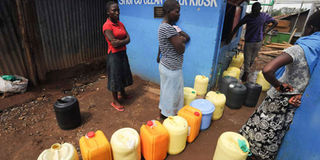Covid 19: The water burden in the slums

As the Covid-19 pandemic spreads its wings across Africa, health experts advise that one of the sure ways to stay safe is to keep your environment clean and wash hands regularly using soap and running water.
Kibra and Mathare in Nairobi are among the slums across the country affected by water scarcity.
Fortunately, in some of the slums, local organisations are devising ways to remedy this gendered problem, somewhat relieving women the burden of providing water in this period of coronavirus spread.
LUXURY
Clean and safe water is a luxury for slum dwellers especially women who are the ones that buy or collect water from whatever sources available. They need the water to clean, cook and for consumption.
A few households access piped water from Nairobi City Water and Sewerage Company, which is rationed to once or twice a week.
Those who can afford buy from private vendors, with a 20-litre jerrican going for Sh5 if bought directly from the point of sale (water vending kiosks) or Sh20 if delivered by cart puller.
POLLUTED RIVERS
Those without money rely on Ngong River or Mathare River, heavily polluted from industrial and human waste, as their water source according to slum-based organisations.
Most women in the slums eke a living from menial jobs or vending ready-to-eat food and fresh produce. Some are housewives.
Putting the face of women in anti-coronavirus' spread campaigns defines the strategies organisations operating in the slums are using to call government’s and well-wishers’ attention in ending the protracted water problem.
CLEAN WATER
"Where is the government to provide adequate clean water to ensure women are able to keep clean their families?" wonders Mr Kiprotich Biwott, secretary of Canaan Women Youth organization, which operates in Soweto and Silanga parts of Kibra slums.
"Here we don't talk about tapped or clean water because there is none. Private entities sell water from boreholes, and it is not even purified. How do you even sell water to already impoverished women?" says Mr Kiprotich adding that extremely poor women are forced to collect water from Ngong River which feeds Nairobi River.
INFECTIONS
He adds, "All the attention will turn to Kibra if one person is infected. It will spread so fast. It will be a crisis. We need water provided for free this moment. We also need sanitisers. Help women protect their children."
Ms Evaline Swila, a resident of Makina in Kibra now feels the burden of expensive water.
She runs a roadside cafeteria in Makina. The consumption of water has risen since March 13, when first case of coronavirus was confirmed in Kenya. She uses more water because of regular hand wash by herself and her clients.
The number of clients visiting her eatery has also declined due to the fear of the virus.
WASHING HANDS
"I have been forced to buy two extra jerricans (20 litres each) of water to ensure the few customers I get have enough water to wash their hands," she says adding that she buys from cart pullers at Sh20 a jerrican.
At home, she has been forced to buy six extra jerricans to maintain high levels of hygiene in the house and of her five children.
"I have no option but to use my savings to keep my family safe," she says.
When the children were in school, she would use two 20-litre jerricans of water a day against the eight jerricans she currently uses. That means she spends an extra Sh120 daily on water alone.
SENSITISATION DRIVE
In Mathare, Shining Hope for Communities (SHOFCO) is running door-to-door sensitisation drives targeting women, owing to their role as main domestic care providers.
"Even as we sensitise the community especially the women on observing their households' hygiene, we are faced by the reality of inaccessibility to clean water and sharing of communal latrines,'' notes Ms Dorothy Wasonga of SHOFCO.
For now, as a temporary solution, they dispense 1,500 litres of water daily, distributed between the five hand washing points located at strategic zones in the slum.
"Each hand washing point receives 300 litres of water. That is 100 litres in the morning, another at noon and the last in the evening. We, however, operate the points till 7pm," she says.
WELL-WISHERS
"We hope other well-wishers could join us in increasing the number of hand washing points so we can reach as many people as possible," she adds.
She says private water vendors have reduced their sales since Monday (March 16), further complicating women's access to the alternative source of water.
Ms Damaris Murugu who lives in BH area of Mathare is lucky to be connected to tap water provided by Nairobi City Water and Sewerage Company. It is, however, open only on Saturdays, she says.
On rare occasions, it is open on Tuesdays too, Ms Murugu adds.
She collects water in 30 jerricans of 20 litres each and for now, she isn't worried about lack of water. But she is concerned about the many women who lack the capacity to keep a stock of water like her.
"I am able to store enough water but what happens to those who can't?" she wonders.





